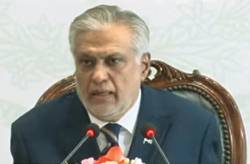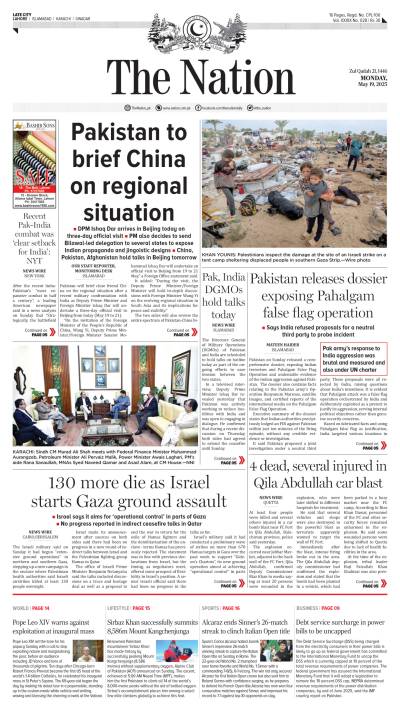DPM Ishaq Dar arrives in Beijing today on three-day official visit n PM also decides to send Bilawal-led delegation to several states to expose Indian propaganda and jingoistic designs China, Pakistan, Afghanistan hold talks in Beijing tomorrow.
ISLAMABAD - Pakistan will brief close friend China on the regional situation after a recent military confrontation with India as Deputy Prime Minister and Foreign Minister Ishaq Dar will undertake a three-day official visit to Beijing from today (May 19 to 21).
“On the invitation of the Foreign Minister of the People’s Republic of China, Wang Yi, Deputy Prime Minister/Foreign Minister Senator Mohammad Ishaq Dar will undertake an official visit to Beijing from 19 to 21 May,” a Foreign Office statement said.
It added: “During the visit, the Deputy Prime Minister/Foreign Minister will hold in-depth discussions with Foreign Minister Wang Yi on the evolving regional situation in South Asia and its implications for peace and stability.”
The two sides will also review the entire spectrum of Pakistan-China bilateral relations and exchange views on regional and global developments of mutual interest.
“The visit forms part of the ongoing high-level exchanges between Pakistan and China. It also underscores the two countries’ shared commitment to further strengthen the all-weather strategic cooperative partnership,” the FO said.
Meanwhile, Prime Minister Shehbaz Sharif has also decided to send a high-level diplomatic delegation to important world capitals to expose Indian propaganda.
In a telephonic conversation with Chairman Pakistan People’s Party Bilawal Bhutto Zardari, the Prime Minister entrusted the leadership of the delegation to him.
The delegation comprises Dr. Musadik Malik, Engineer Khurram Dastgir, Senator Sherry Rehman, Hina Rabbani Khar, Faisal Subzwari, Tehmina Janjua and Jalil Abbas Jilani.
The delegation will visit London, Washington, Paris, and Brussels to highlight India’s disinformation campaign and its attempts to destabilize peace in South Asia.
It will also underscore Pakistan’s sincere efforts for peace and stability in the region.
Later, Bilawal, in a post on X, announced that he was appointed by the premier to “lead a delegation to present Pakistan’s case for peace on the international stage”.
“I am honoured to accept this responsibility and remain committed to serving Pakistan in these challenging times,” he wrote.
Meanwhile, Afghanistan’s Acting Foreign Minister Amir Khan Muttaqi is set to arrive in China tomorrow to join the trilateral meeting between China, Pakistan and Afghanistan.
During the recent escalation with India, China voiced its support for Pakistan with Chinese ambassador reaffirming the “enduring and time-tested friendship between China and Pakistan”, describing the relationship as one of “ironclad brothers” who have always supported each other in challenging times.
Pakistan armed forces launched a large-scale retaliatory military action, named “Operation Bunyan-um-Marsoos”, and targeted several Indian military targets across multiple regions.
The strikes, described by officials as “precise and proportionate”, were carried out in response to India’s continued aggression across the Line of Control (LoC) and within Pakistan’s territory, which New Delhi claimed were aimed at “terrorist targets”.
Pakistan downed six Indian fighter jets, including three Rafale, and dozens of drones. After at least 87 hours, the war, provoked by India, ended on May 10 with a ceasefire agreement brokered by the United States.
According to ISPR, a total of 53 individuals, including 13 personnel of the armed forces and 40 civilians, were martyred in Indian strikes during the recent military confrontation.
The military confrontation between the two countries was triggered by last month’s attack in Indian Illegally Occupied Jammu and Kashmir (IIOJK) that left 26 tourists dead, with India blaming Pakistan for the attack without offering any evidence.






